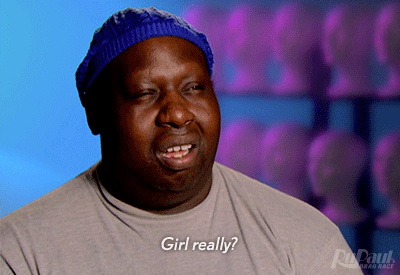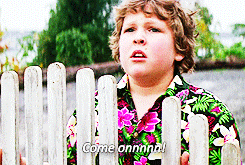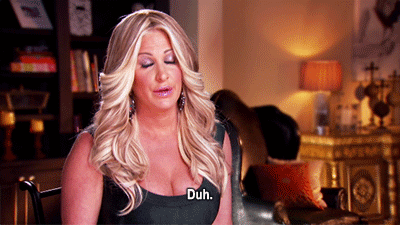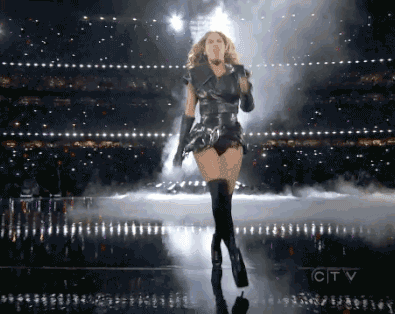Singers and songwriters never need to worry about grammar. In fact, they actually benefit from flouting grammar rules.
It simply wouldn’t be the same if the Rolling Stones sang “Whom Do You Love” or “I Can Get No Satisfaction,” right? Songs don’t typically contain correct grammar, but that’s O.K. because they don’t need to.
The only thing that matters when it comes to music is whether or not it has the ability to make us do this:

(Rappers probably don’t use correct grammar in their everyday speech, but hey, what can we expect from people who make money by letting us know just how much money they have?)
So if I told you that I’m going to reference a handful of songs as examples of correct grammatical practice, you’d probably be like:
But hear me out.
Have you ever said something like this?
I wish I was sipping margaritas on the beach right now.
If you’ve ever said “I wish I was” or “I wish she/he was,” you’ve committed a grammatical gaffe.
Why? What’s wrong with that sentence above? It should be: I wish I were sipping margaritas on the beach right now.
I know what you’re thinking. The subject “I” is singular, so why does it take the plural verb “were”?
Here’s why:
The Subjunctive
That sentence is an example of the subjunctive mood.
The subjunctive is one of those aspects of grammar that people don’t discuss as regularly as they discuss punctuation or subjects and objects. You may not know what it is, but I guarantee you’ve seen it before.
The world of music is loaded with song titles that have verbs in the subjunctive mood:
- Beyoncé’s “If I Were a Boy”
- Johnny Cash’s cover of “If I Were a Carpenter”
- The Boss’s “I Wish I Were Blind”
- Frank Sinatra’s cover of “I Wish I Were in Love Again”
- Tevye’s “If I Were a Rich Man”
- Sister Sarah’s “If I Were a Bell”
What is the Difference between “Were” and “Was”?
The words “were” and “was” are both past tense forms of the verb “to be,” but they are used differently based on the subject of the sentence.
- Was: “Was” is used with singular subjects in the past tense, except for “you”. It is appropriate for first person singular (I), third person singular masculine (he), feminine (she), and neuter (it). For example:
- I was at the store.
- He was happy.
- She was a teacher.
- It was a sunny day.
- Were: “Were” is used with plural subjects and also with the pronoun “you,” which can be singular or plural. It is used for first person plural (we), second person singular and plural (you), and third person plural (they). For example:
- We were at the party.
- You were late.
- They were students.
Why Is “I Wish I Were” Correct?
The phrase “I wish I were” is considered correct in English due to the use of the subjunctive mood.
The subjunctive mood is used for statements that are hypothetical, wishful, or contrary to fact. It is a special kind of present tense used to talk about situations that are not real or unlikely.
In the case of “I wish I were,” even though “I” is a singular subject which typically would be paired with “was,” the subjunctive mood requires “were.” This usage indicates something that is not true or is hypothetical. For instance, if you say “I wish I were taller,” you are expressing a wish for something that is not a current reality.
The subjunctive is less commonly used in everyday English now, and many people use the past tense “was” instead in casual conversation. However, “were” is still considered the grammatically correct choice in formal writing or in a more formal speaking context.
The Mood of Wishful Thinking
The subjunctive is used when a sentence expresses a wish. If a sentence is wishful, you use the subjunctive form of the verb “to be”: “were.” This may seem counterintuitive, but even if the subject of the sentence is singular, you use “were.”
That’s why Bruce Springsteen sings, “I wish I were blind” and why Frank Sinatra says, “I wish I were in love again.” Some more examples:
I love Beyoncé. I wish she were my best friend.
Frank Sinatra has the voice of an angel. I wish he were still alive.
Contrary-To-Fact Conditions
The subjunctive is also used in sentences that express contrary-to-fact conditions. Beyoncé sings, “If I were a boy.” She uses “were” instead of “was” because she’s talking about something that’s contrary to fact: Beyoncé is not a boy.
She’s simply indulging in her imagination when she sings those words.
And consider Johnny Cash when he sang, “If I were a carpenter.” Cash sang about something that wasn’t true; he wasn’t really a carpenter. It’s the same thing with the song from Fiddler on the Roof. Tevye, who sings the song, isn’t rich; he’s just fantasizing about what his life would be like if he were rich.
Some more examples:
If I were my own boss, I would take three-day weekends.
If my mom were ruler of the free world, she would declare Beyoncé’s birthday a national holiday.
I’m not really my own boss, and my mom isn’t really the ruler of the free world. These sentences are imaginary situations, so they use the subjunctive form of “to be.”
But like any good grammar rule, the subjunctive mood can get a little tricky. Just because a sentence starts with “If” doesn’t mean you use the subjunctive. Take this sentence:
I took off work this Friday. If I was in the office, I would have listened to my coworkers talk about sports.
I would not use the subjunctive in this sentence because here I’m talking about something that could have happened. When I say “If I was in the office,” I’m not talking about something improbable or false or contrary to fact. It’s a very real possibility that I was in the office on Friday. In fact, I am in the office every Friday, and the only reason I wasn’t at work on this particular Friday is because I took off.
You use the subjunctive only when you’re talking about an imaginary situation, something that’s not real/true, or something that doesn’t align with reality.
Requests and Demands
Finally, the subjunctive is used to express a request, recommendation, demand, or command.
Beyoncé requests that all of her dancers be on time for rehearsal.
This sentence talks about Beyoncé’s request, so it needs the subjunctive “be” rather than “are.”
I suggest that my mom buy tickets for the concert.
(“Buy” not “buys”)
I demand she go with me to the concert.
(“Go” not “goes”)
It is imperative that the concert begin on time.
(“Begin” not “begins”)
It is essential that she sing live.
(“Sing” not “sings”)
If I Were a Boy…
And that’s the subjunctive.
It was once used more frequently than it is today. Its use is slowly waning, but as you can see, it still survives. And until second orality gobbles it up, we can keep singing, “If I were a boy.” And on that note:
Sources:
After Deadline on The New York Times
GIFs here



